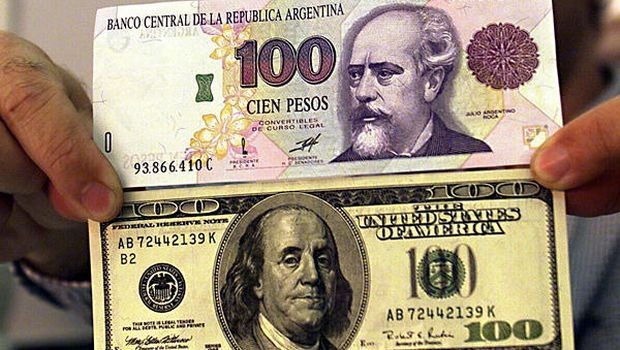RIO DE JANEIRO, BRAZIL – After severe measures by the Argentine government that decreed control of the exchange rate on Sunday, September 1st, the dollar fell 5.8 percent on Monday, September 2nd. It was the first devaluation of the currency since mid-August and before the declaration of the partial moratorium.
The official price of the dollar closed on Tuesday, September 3rd at 54.99 pesos. The parallel rate (called blue) that is traded in exchange houses rose 0.79 percent to trade at 63.50 pesos, which indicates there is still a lot of uncertainty despite the strong intervention of the government.
On Sunday, September 1st, the government announced measures restricting access for individuals to dollars, but setting a high ceiling for purchases at US$ 10,000 (R$40,000) per month.
“I earn 18,000 pesos per month [about US$300], and 2,500 (US$41) is spent on medicine. But I came here today to see what direction it’s heading if it’s worth buying a little to keep,” said retired Pietro Manizales, 77, who went to a currency exchange in the center.
The government’s biggest fear was that people would get pesos at the bank and buy dollars to protect themselves. This could trigger additional pressure on prices and push the country into hyperinflation.
With prices rising by 54 percent a year, there are economic debates. At a press conference on Monday morning, Finance Minister Hernán Lacunza stated that the measures to restrict access to dollars are aimed at stabilizing the price of the American currency during the electoral process.
The Argentinian elections will take place on October 27th, and the opposition, led by Peronist Alberto Fernández, is the favorite.
The advantage of the Peronists, who avoid saying how they intend to deal with the economic crisis, is feeding the current exchange rate instability.
When asked if his measures were agreed by the opposition, Lacunza said there was communication, but there is no “co-government” at this time. That is, it is up to Macri to decide on what to do to calm the markets.
Abroad, Argentine debt securities denominated in euros and dollars fell to record lows on Monday, while financial sector stocks gave way.
On the streets of downtown Buenos Aires, banks and bureaus had queues, but there were no disturbances, only confusion from Argentinians about the new measures.
Many asked the bank branches to find out what would happen with their deposits, which, in the country, can be made in dollars or pesos.
The government flooded the banks with U.S. currency banknotes to meet the demand from account holders who sought out branches in Buenos Aires after the announcement on Sunday that access to dollars would be more restrictive.
Cars were circulating in the financial center of the capital. Also contributing to the moderation was the holiday in the U.S., which naturally reduces business in dollars.
In 2001, the accounts of Argentinians were frozen, but they did not touch the bank reserves. However, frightened bank customers were trying to get in and take what was there, for fear that the next step by the government would prevent access to these assets.
This caused, among other things, violence against the banks, as doors were broken down and windows broken.
An official of a branch of Banco Macro said that there was “above-normal” movement in relation to safe-deposit boxes in Argentina as it is possible to keep dollars not only in current accounts but also in safe-deposit boxes.



